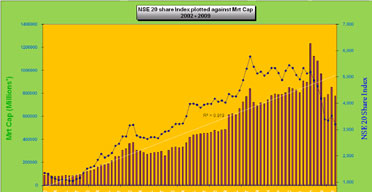NAIROBI, Kenya, Nov 11 – Some say investing is science while others believe it’s an art. I believe it is an art acquired from experience. The main objective of investing is getting returns. These returns however need to be realistic.
The question many investors would ask is how can I have realistic expectations when markets become turbulent and begin to turn downward?
In previous articles, we have talked of two main considerations when making any investment. These are having an investment objective and a time frame. Also important is evaluation of your comfort with risk. Determining your comfort should determine your expectations. Many investors opt to pull out of an investment whenever these investments do not meet their expectations. Many are times when this decision is based on unattainable returns.
Investors who are unwilling to lose their principle investments and lack the capacity to absorb huge losses are often advised to choose investments that are less prone to market fluctuations such as cash related investment and bonds.
These investors however fail to understand the golden investment rule of risk and return. That is, “the higher the risk the higher the return or the higher the risk, the greater the possibility of making a loss on the investment”. This means that they are often dissatisfied from the returns on their investments yet they had chosen low risk investments. The opposite is true and has a similar effect.
One of the greatest investment lessons is learning from experience. Investing has its share of experiences. People who have invested for longer periods are more likely to understand the behaviour of markets and are therefore more likely to make the right investment decisions if they learnt from their experiences in it. In brief, these investors are more likely to have realistic expectations than those who are new to the market and are out to make a quick buck.
In relation to these experiences, markets often have cycles. There are periods of booms where returns are above normal and there are bears where markets take a slide and returns deteriorate to an extent that some investors choose to pull out. It is not realistic to expect markets to experience these “highs” forever. It is therefore useful to average the high and low prices over the period you are invested in the markets.
Investors are cautioned against putting emotions into investment. Greed and fair are likely to work towards your downfall. Emotions have no place in investments. Whenever markets turn sharply many investors shake with fear. The press is also full of pessimistic views on the expected market performance. In such situations ignore the negative sentiment and stick to your investment plans as sooner or later the markets will turn upwards.
Investments in cash, bonds, stocks and commodities should not be looked at as “get rich quickly schemes.” Investors who look at it in this way are those with a short term investment horizon and often lose.
It is very important to ignore negative market sentiment whenever markets begin to decline. The truth is news rarely gives an objective view of the performances of markets and reviews are often made with a short-term view. In addition, no one really knows when markets will turn, not even investors who have been in the markets for long or experts who always seem to have a view on anything happening in the markets.
It is also important to distinguish between sound investment advice and fabricated advice from fellow investors. It is common to hear other investors bragging about how their investments are getting higher than normal returns even when markets are experiencing a general decline. In such cases be firm and maintain your investment strategy.
Finally and as in all investment decisions, it is important to consult an investment adviser before making investment decisions. A good financial adviser has seen it all and is better placed to advice you based on your investment objectives, horizon, and comfort with risk. Only then can you be sure that your expectations are realistic.



































